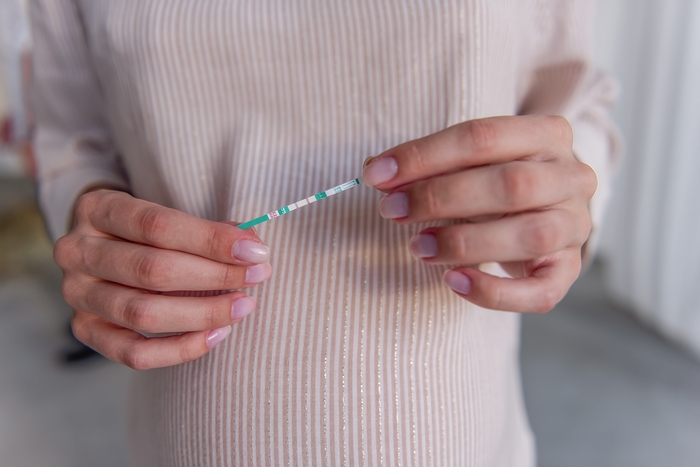
94% of women see perimenopause symptom relief with Midi
Midi’s menopause-trained clinicians provide expert, insurance-covered care to treat perimenopause symptoms like hot flashes, brain fog, and sleep issues—so you can start feeling better, fast.

Pregnancy affects every woman differently, which means not all women will experience the same early symptoms and signs of pregnancy. Before you rush into buying a pregnancy test, it helps to familiarize yourself with the first signs of pregnancy so you can determine whether you may be pregnant or your symptoms are a sign of another condition.
Many women don’t know they’re pregnant until they miss a period. Even then, irregular menstruation is common and may not necessarily indicate that you’re pregnant, according to the National Institutes of Health (NIH).
Many early pregnancy symptoms are similar to those of menstruation. Women can have spotting, breast tenderness, headaches, fatigue, mood swings, and bloating early on, according to the NIH All these symptoms are also early symptoms of impending menstruation.
The best way to know if you’re pregnant is to take a pregnancy test or to see your doctor, who can confirm pregnancy by using a blood or urine test. Until then, understand that not all women experience early symptoms of pregnancy, which is why it’s important to track your menstrual periods and seek treatment if you experience any irregularities.
A missed period is usually the first clue that you might be pregnant, reports the Department of Health and Human Services (DHHS). Your fertility window occurs a few weeks before your period, which means that if you become pregnant during that time, you will miss your period when you’re expecting it a few weeks later. However, a missed period may also be caused by factors including polycystic ovarian syndrome (PCOS), eating disorders, extreme fluctuations in weight, stress, and the use of certain medications, reports the DHHS.
Make an appointment with your doctor following a missed period if your pregnancy test comes back negative. Your doctor may order other lab tests to identify the root cause of your menstrual irregularity and talk to you about your available treatment options.
Spotting affects an estimated 25% of women at the beginning of pregnancy, occurring about six to 12 days after conception when the fertilized egg is implanted, reports the NIH. The blood released during spotting is generally lighter in color than normal menstrual blood and may also be accompanied by menstrual cramps.
Your breasts and/or nipples may become more tender, swollen, and sensitive as early as one to two weeks after conception, reports the NIH. This occurs due to hormonal changes that prepare the breasts for pregnancy and breastfeeding. Throbbing, soreness, tingling sensation, heaviness, and a sense of fullness are common early pregnancy symptoms that may affect your breasts.
Pregnancy will cause your body to produce higher amounts of progesterone, which is a hormone that promotes a healthy pregnancy and stimulates breast milk production. Higher progesterone production can often make you feel fatigued and more tired than usual, even if you’re not physically exerting yourself. According to the NIH, pregnancy fatigue can begin as early as one week after conception.
During early pregnancy, the hormone fluctuations you experience can cause frequent bouts of nausea, also known as morning sickness. However, nausea can strike at any time of day. According to the NIH, morning sickness usually begins anywhere between two to eight weeks after conception and continues until weeks 14 to 16, though some women experience nausea throughout their pregnancies.
Morning sickness is one of the least desirable symptoms you may experience during early pregnancy, though you may be able to reduce its frequency and severity by eating healthy foods, exercising regularly, and avoiding secondhand smoke, and unpleasant odors.
The hormone fluctuations that occur when you’re pregnant will cause you to experience a wide range of symptoms during the earliest days and weeks. According to the University of Rochester Medical Center and NIH, additional early pregnancy symptoms you may experience include:
Many early pregnancy symptoms are temporary and will go away by the end of your first trimester. However, some women may experience these symptoms for a longer period or the entire pregnancy.
If you think you may be pregnant or feel that something is “off” about your health, consider taking a pregnancy test and making an appointment with your OB-GYN—especially if you are experiencing one or more symptoms of early pregnancy.
No, not all women experience early symptoms of pregnancy. Some may not realize they're pregnant until they miss a period.
Early signs of pregnancy can include a missed period, spotting, changes in breasts, fatigue, and nausea.
Yes, many early pregnancy symptoms are similar to those of menstruation, including spotting, breast tenderness, fatigue, mood swings, and bloating.
The best way to confirm pregnancy is through a pregnancy test or a consultation with a doctor who can perform a blood or urine test.
Many early pregnancy symptoms are temporary and may disappear by the end of the first trimester. However, some women may experience these symptoms throughout their pregnancy.

Midi’s menopause-trained clinicians provide expert, insurance-covered care to treat perimenopause symptoms like hot flashes, brain fog, and sleep issues—so you can start feeling better, fast.